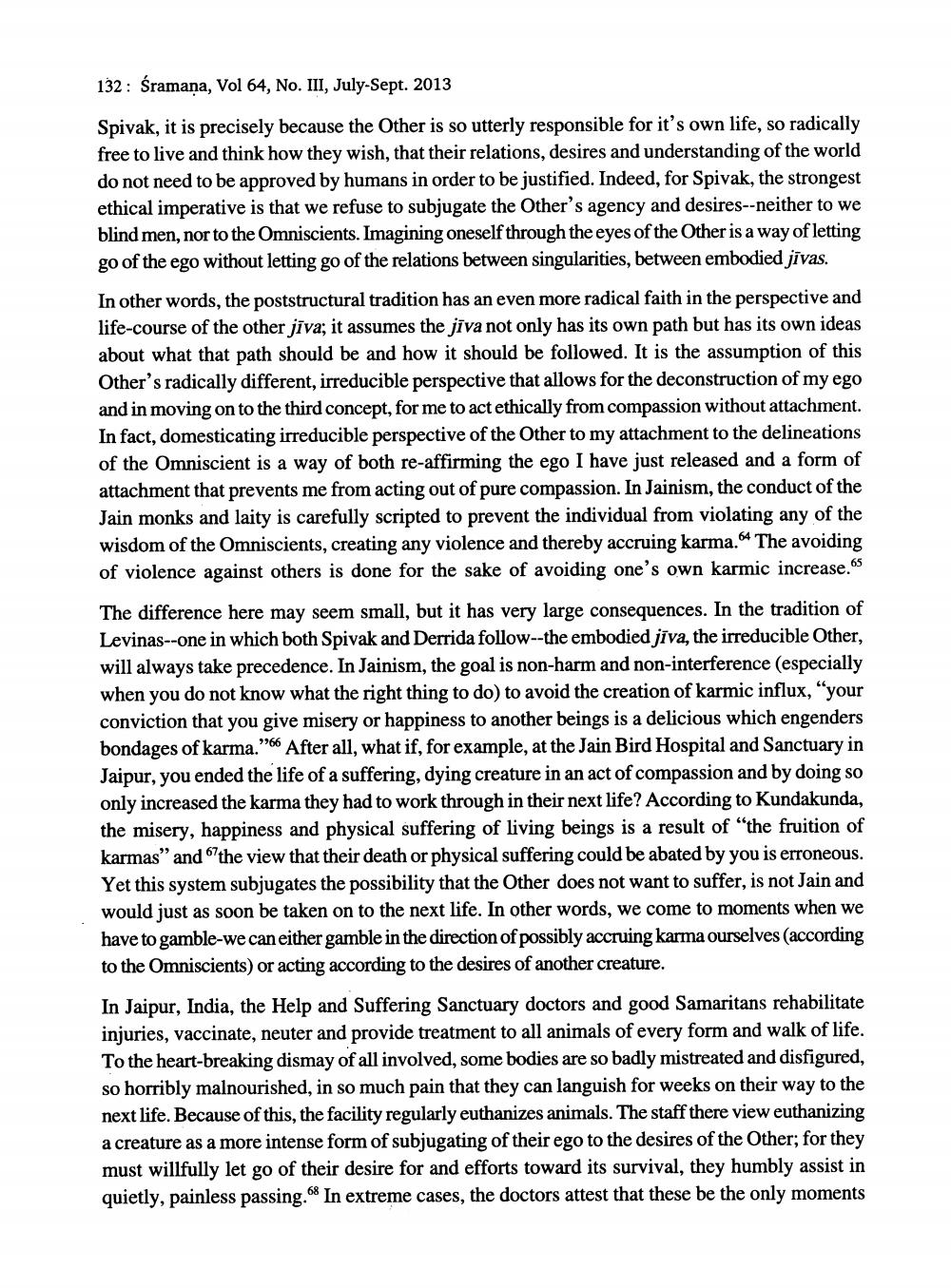________________
132: śramana, Vol 64, No. III, July-Sept. 2013
Spivak, it is precisely because the Other is so utterly responsible for it's own life, so radically free to live and think how they wish, that their relations, desires and understanding of the world do not need to be approved by humans in order to be justified. Indeed, for Spivak, the strongest ethical imperative is that we refuse to subjugate the Other's agency and desires--neither to we blind men, nor to the Omniscients. Imagining oneself through the eyes of the Other is a way of letting go of the ego without letting go of the relations between singularities, between embodied jīvas. In other words, the poststructural tradition has an even more radical faith in the perspective and life-course of the other jīva; it assumes the jīva not only has its own path but has its own ideas about what that path should be and how it should be followed. It is the assumption of this Other's radically different, irreducible perspective that allows for the deconstruction of my ego and in moving on to the third concept, for me to act ethically from compassion without attachment. In fact, domesticating irreducible perspective of the Other to my attachment to the delineations of the Omniscient is a way of both re-affirming the ego I have just released and a form of attachment that prevents me from acting out of pure compassion. In Jainism, the conduct of the Jain monks and laity is carefully scripted to prevent the individual from violating any of the wisdom of the Omniscients, creating any violence and thereby accruing karma. 64 The avoiding of violence against others is done for the sake of avoiding one's own karmic increase.65
The difference here may seem small, but it has very large consequences. In the tradition of Levinas--one in which both Spivak and Derrida follow--the embodied jīva, the irreducible Other, will always take precedence. In Jainism, the goal is non-harm and non-interference (especially when you do not know what the right thing to do) to avoid the creation of karmic influx, “your conviction that you give misery or happiness to another beings is a delicious which engenders bondages of karma.” After all, what if, for example, at the Jain Bird Hospital and Sanctuary in Jaipur, you ended the life of a suffering, dying creature in an act of compassion and by doing so only increased the karma they had to work through in their next life? According to Kundakunda, the misery, happiness and physical suffering of living beings is a result of the fruition of karmas” and the view that their death or physical suffering could be abated by you is erroneous. Yet this system subjugates the possibility that the Other does not want to suffer, is not Jain and would just as soon be taken on to the next life. In other words, we come to moments when we have to gamble-we can either gamble in the direction of possibly accruing karma ourselves (according to the Omniscients) or acting according to the desires of another creature.
In Jaipur, India, the Help and Suffering Sanctuary doctors and good Samaritans rehabilitate injuries, vaccinate, neuter and provide treatment to all animals of every form and walk of life. To the heart-breaking dismay of all involved, some bodies are so badly mistreated and disfigured, so horribly malnourished, in so much pain that they can languish for weeks on their way to the next life. Because of this, the facility regularly euthanizes animals. The staff there view euthanizing a creature as a more intense form of subjugating of their ego to the desires of the Other; for they must willfully let go of their desire for and efforts toward its survival, they humbly assist in quietly, painless passing. In extreme cases, the doctors attest that these be the only moments




